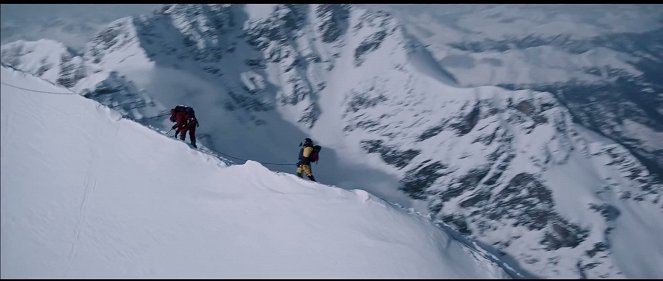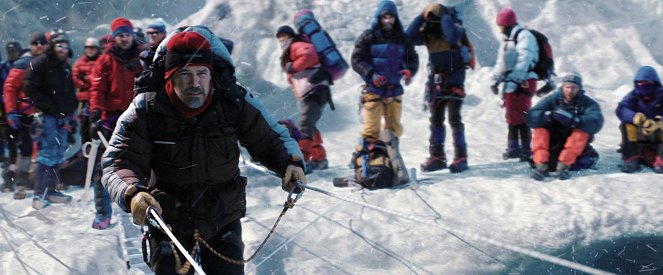Director:
Baltasar KormákurCámara:
Salvatore TotinoMúsica:
Dario MarianelliReparto:
Jason Clarke, Jake Gyllenhaal, Josh Brolin, John Hawkes, Sam Worthington, Robin Wright, Michael Kelly, Keira Knightley, Emily Watson, Thomas M. Wright (más)Streaming (2)
Sinopsis(1)
Inspirada en los increíbles acontecimientos que tuvieron lugar en 1996 durante un intento por alcanzar el pico más alto del mundo, 'Everest' describe el impresionante recorrido de dos expediciones que se enfrentan a una de las peores tormentas de nieve que jamás se haya conocido. El temple de los alpinistas se pone a prueba cuando deben luchar contra la furia desatada de la naturaleza y superar obstáculos imposibles en un desesperado esfuerzo por sobrevivir. Lo más importante ya no será alcanzar la cima, sino salir vivos de la experiencia. (Universal Pictures España)
(más)Videos (25)
Reseñas (18)
Kormákur decidió rodar su película más ambiciosa hasta la fecha de la forma más realista posible, sin los adornos tradicionales de Hollywood ni las situaciones dramáticas inducidas artificialmente, haciendo de Everest una reconstrucción casi documental de los hechos reales en los que se inspira. Pero adolece de demasiados personajes: al menos dos docenas que se abren camino hacia la cima, con muchos más esperando abajo o en casa. Son tantos que un gran número de ellos sólo están presentes de forma periférica en la película y no reciben el espacio suficiente para que uno forme una conexión emocional con ellos, lo que es una pena dado el reparto estelar. La película está bien hecha en términos de artesanía, pero carece de inventiva y de ideas. Como fatídico testimonio sobre la superación de uno mismo, sobre la fuerza del espíritu humano y sobre el hecho de que al final la naturaleza siempre tiene la última palabra, Everest funciona. Por lo demás, sin embargo, es una película sin riesgo para el espectador, en la que un simpático intento de verosimilitud y realismo queda redimido por la falta de dramatismo y la masificación.
()
Todas las personas con las que simpatizas se meterán en grandes problemas. Esta es la única ambición dramatúrgica de Everest. Un producto de marketing IMAX que utiliza apenas la mitad de la pantalla IMAX con un formato panorámico. Un guión puramente promedio sin un solo diálogo, momento o personaje que valga la pena mencionar. El excelente elenco internacional no tiene prácticamente nada para interpretar, y el personaje de Gyllenhaal, que más esperábamos, tiene 3 veces más espacio que en los avances. Imágenes visuales bonitas, entorno de Everest auténtico. Tomas impresionantes desde arriba de la escalada expuesta debajo del escalón de Hillary. El arma clave de la película es la intensidad de la tormenta que te clavará en el asiento en un cine con buena acústica (Dolby Atmos positive). La película por suerte no distorsiona la realidad, no posa y no se rebaja a sí misma por su propia estupidez (Límite vertical). Pero Cara Norte también es así, que además de eso no huele a la chapuza de estudio y, al contrario, describe con entusiasmo narrativo e interés por los personajes la ascensión históricamente más significativa y más dramática al Eiger suizo (que es un diferente nivel de escalada que la «caminata» al Everest).
()
A precise survival drama with a fantastic cast that in some cases is too good given the few lines they have. The experiential capacity of the film is substantial. In some scenes it manages to grip and amaze, not only through the mountain setting, but also with the convincingly performed suffering of the leading characters. Things get unfortunately a little chaotic after some time with them covered in jackets and hoods and with the snow falling, they all look very similar and there were moments that I wasn’t really sure who was who. But overall, a recommending thumbs up.
()
The filmmakers’ indecisiveness about which of the roughly six more significant characters would be the main protagonist probably stems in part from the fact that they relied on the memories of all of the survivors and their loved ones in an attempt at a comprehensive view of the tragedy instead of relying on a single source (Krakauer’s book, which had already been made into the television movie Into Thin Air: Death on Everest, would have served the purpose). No time or space remains for the more thorough development of the characters, who comprise merely a few types; usually the more interesting they are, the more charismatic the actor playing them (the cocky Texan, the easy-going American mountain guide, the responsible New Zealand mountain guide, the humble mailman who wants to fulfil his dream, the loving and caring women). Despite the faint outlining of the characters, the first hour of the film is important, as that is when, in addition to the dangers that await them, we are presented with the relationships between the characters and their ambitions and motivations. We thus better remember their names and later, despite the layer of frozen snow and the dark glasses on their faces, we can recognise who is shouting at whom. At the same time, the fatal decisions that some of the characters make (the bond between Rob and Doug) are more understandable and we are also better able to find our bearings in the individual sections of the journey to the summit, which are presented to us in advance. Whereas the formula of a disaster film is fulfilled by spreading attention among multiple characters, the disaster itself does not serve as punishment for the sins committed by the immoral characters. Atypically, perhaps out of respect for the victims, this is a drama about a group of good people who try to help other good people (The Martian will probably offer a similar story soon). There is no enemy to be defeated, nor is there a character who is supposed to see the light and undergo a transformation based on experience (if he had been a bit more inattentive toward his wife, Beck could have fulfilled this pattern of development). The will to survive is crucial. There is something similarly and likably old-world about the idea of “we have to help each other” as there is about the strictly linear narrative with no flashbacks and with a single (inappropriate) dream sequence. All of the information conveyed, which seems needless on the surface, is put to good use by Kormákur in the film’s second, extremely intense half with astonishing momentum (literally in places) and only a few sentimental moments (though the narrative is structured around them – see the storyline with the unborn child – so they are not superfluous). It serves no purpose to confront the protagonists with the question that will probably occur to every viewer who is not a mountain climber – why do they do it? After all, the rules of the game are not set by people in the second half, but by nature. In the spirit of the cinema of attractions (not intellectual), the aim is to provide an immediate visceral experience. In hindsight, I realise that’s not much. Immediately after the screening (IMAX 3D), however, with the subsiding feeling that I had just descended from the summit of the world’s tallest mountain, I found that I could not have wanted anything more. 75%
()
(menos)
(más)
After a second screening (and having learned about the making of this film), I'm pretty clear: the production values of Kormákur’s film are breathtaking. Whether it's the visuals, the actual locations where it was filmed, the plethora of great special effects that are naturally incorporated into the picture so that you don't even recognize them, and behind all of that there is a subtle tribute to the guys for whom mountains are everything. We can make a comparison here with, for example, the rather dumb Vertical Limit, where the mountains are just a vehicle for stupid stunts that are a laughing stock for real climbers. Everest, in contrast, has a real believable dimension and yet it is deep and human. The fact that you may think mountaineers are weirdos with obsessive compulsive behavior who gamble with their lives is actually pretty irrelevant, petty, and just your problem. Everest can proudly stand alongside some famous French mountaineering-themed films, which are pretty good on their own, and it’s certainly the best mountaineering film Hollywood has ever produced.
()



Anuncio